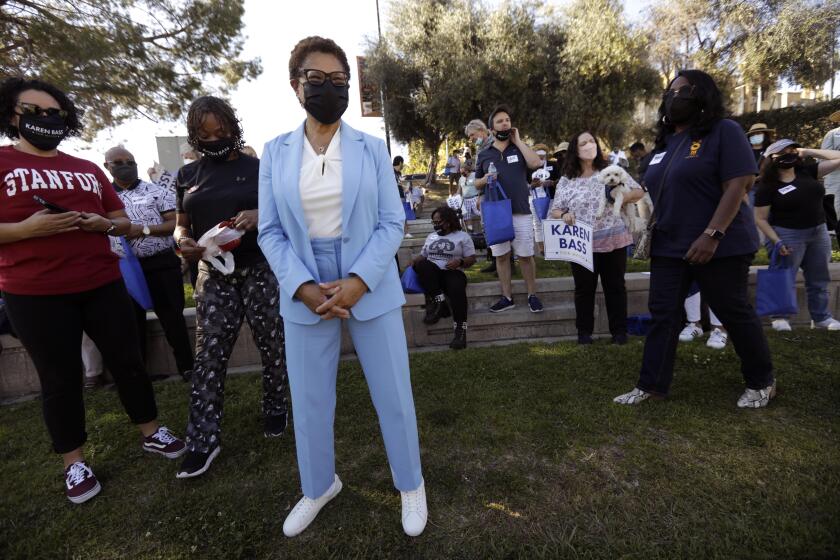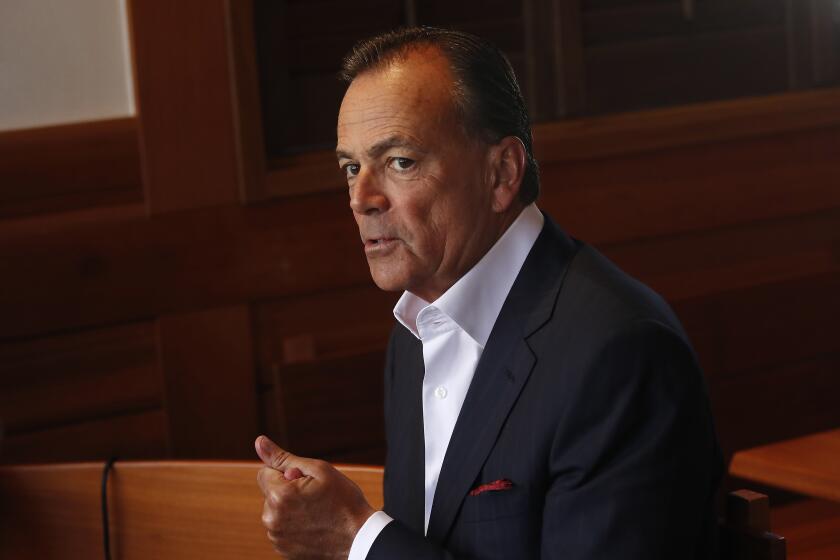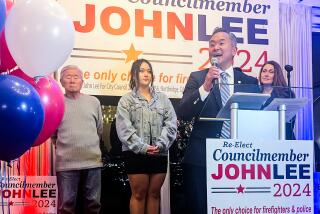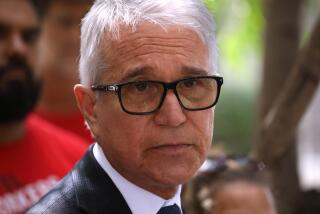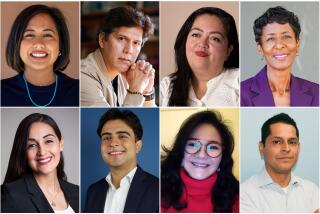‘Race is wide open’: New L.A. mayoral poll shows Bass and De León in close proximity
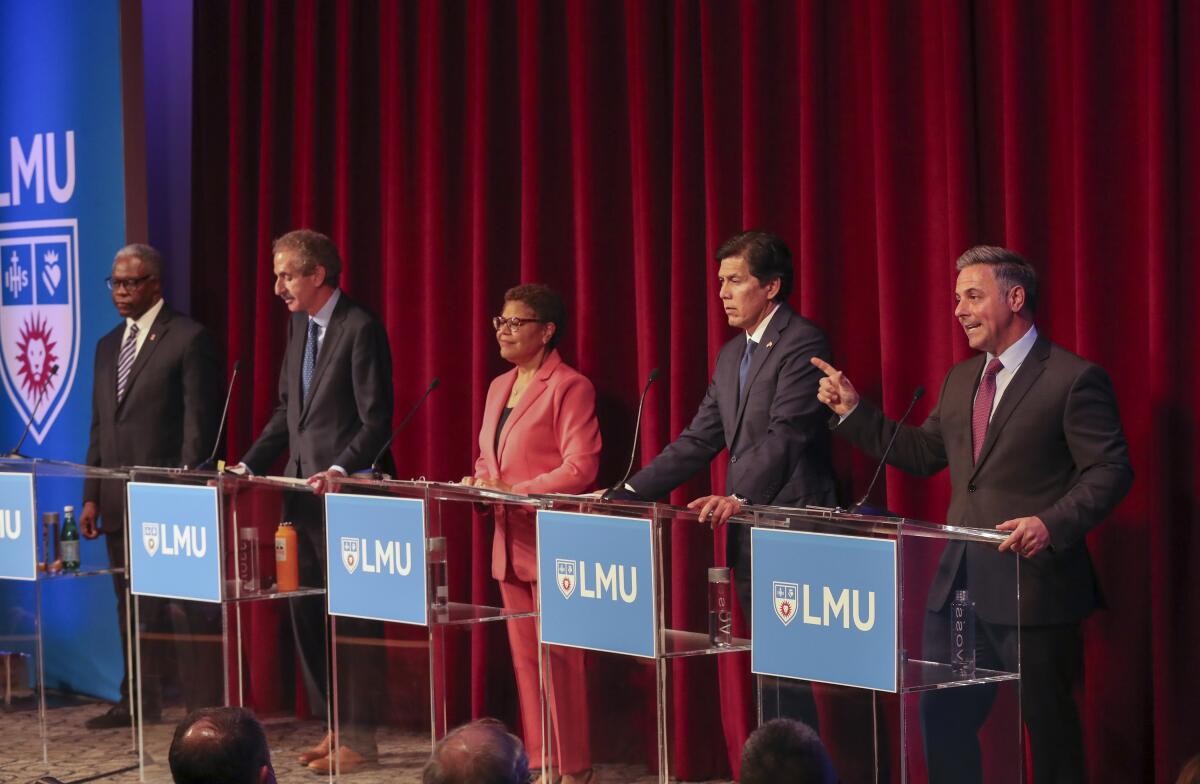
A new poll shows a different shape of the Los Angeles mayoral race than previous polling, with no commanding front-runner.
Rep. Karen Bass still has a small lead in the Loyola Marymount University Center for the Study of Los Angeles poll released Wednesday, but City Councilman Kevin de León is a close second.
With the June primary just over three months away, more than 40% of self-identified registered voters remain undecided in the survey.
About 16% of respondents said they would choose Bass if the election were held today and about 12% said they would choose De León. None of the other candidates in the poll were above single digits.
“The race is wide open in my mind,” said Fernando Guerra, director of LMU’s Center for the Study of Los Angeles. “This poll says there’s an opportunity for someone to catch fire and catch up quickly.”
Along with Bass and De León, Councilman Joe Buscaino, City Atty. Mike Feuer and real estate developer Rick Caruso are among the other prominent candidates in a field of dozens vying to replace Mayor Eric Garcetti.
The poll, which was conducted before Caruso entered the race, shows Buscaino and Feuer with about 8% and 7% support, respectively, and Caruso at 6%.
Former Metro board member Mel Wilson, entrepreneur Ramit Varma and downtown business leader Jessica Lall (who dropped out of the race in early February) were also included in the poll and all received less than 5% support.
The LMU poll, which has a margin of sampling error of approximately 3.4 percentage points in either direction for self-identified registered voters, was conducted from Jan. 4 to Feb. 10.
(Guerra serves as a senior strategic advisor at De Aztlan Group, a consulting firm run by his wife. Guerra is not currently registered as a lobbyist with the city and said that none of the firm’s current clients are lobbying the city.)
The LMU poll paints a notably different picture of the race than a UC Berkeley Institute of Governmental Studies poll co-sponsored by the Los Angeles Times released two weeks ago, which showed Bass as the clear front-runner with just under a third of likely voters saying she was their first choice.
Voters would advance Rep. Karen Bass to the November runoff by a wide margin if the Los Angeles mayoral primary were today, according to a new poll co-sponsored by The Times.
There are a couple of key differences in how the UC Berkeley IGS/Times poll and the LMU poll were conducted: The Berkeley IGS/Times poll surveyed just over 2,100 Los Angeles residents from the state’s official list of registered voters and also reported the views of 1,446 who appeared likely to vote in June based on their degree of interest in the race and their past voting history.
The LMU survey polled 815 city residents who self-identified as registered voters, part of a larger survey of a random selection of Angelenos. The mayoral polling was part of the university’s annual Los Angeles Public Opinion Survey, which surveyed 2,002 county residents and a 1,000 city residents on various matters.
The LMU poll was conducted over a much longer time period and through a variety of contact methods (in person, phone and online), while the Berkeley IGS/Times poll was conducted during a single week in early February by email.
“The longer time frame can pick up on variations,” said Sara Sadhwani, an assistant professor of politics at Pomona College. She noted that the field and people’s level of knowledge about the race can change during that time. The LMU poll was also conducted in English, Spanish, Korean and Mandarin, while the Berkeley IGS/Times poll was conducted in English and Spanish.
Though the LMU poll showed De León slightly behind Bass, Guerra characterized the findings as most positive for the city councilman. Guerra cited the large percentage of Latino voters who are undecided (about 46%), saying the Latino vote tends to “break late,” with Latino voters wanting more information and mobilization before making a decision.
De León currently has the support of about 17% of Latino respondents — more than any other candidate — in the LMU poll.
“I say that bodes well for Kevin because once they decide, they tend to decide strongly for Latino candidates, all things being equal,” Guerra said.
Sadhwani, who studies Latino and Asian voting behavior, agreed with Guerra’s assessment of Latino voting patterns. Latinos account for nearly a third of the more than 2 million registered voters in the city, according to Political Data Inc., but they accounted for only 22% of the likely voters in the Berkeley IGS/Times poll, indicating that so far, many Latinos have not engaged with the mayoral race.
Bass has the support of more than a third of Black voters and leads with white and Asian respondents, though by a much smaller margin. De León has a modest lead with voters younger than 45 and Bass holds the advantage with voters 45 and older. De León has a slight lead with male voters, and Bass has a slight lead with female voters.
Political consultant Bill Carrick, who was advising Jessica Lall before she dropped out of the race, said that Bass appeared to have more of a base than anyone else, particularly with Black voters, but noted that distinct coalitions of support had yet to emerge for any one candidate.
“There isn’t a lot of structure to the race,” Carrick said.
Bass also holds a slight lead with respondents who identify as liberal or moderate, with De León trailing her in both categories. Caruso leads with voters who identify as conservative, trailed by De León.
The billionaire former Republican’s late entrance into the field remains a major unpredictable factor in the race, particularly because Caruso’s personal wealth means he can spend far more than other candidates.
The LMU poll shows Caruso with a slightly smaller share of support than the Berkeley IGS/Times poll, which had Caruso tied with De León at 8%. Caruso’s lower showing here likely stems in part from the earlier start date on the LMU poll, which began well before most people were talking about his potential candidacy.
Rick Caruso has considered running for L.A. mayor before but has never jumped in. For this year’s race, he promises a “final decision shortly.”
“I’m really curious to see and track the extent to which that may or may not change, particularly as we begin to see the barrage of advertisements that he’s putting out,” Sadhwani said of Caruso.
This year’s mayoral election coincides with state races and the congressional midterm contests, rather than being held in an odd-numbered year as in the past, meaning it will likely see significantly higher turnout than the dismal numbers that have dominated the recent past.
But with several months to go before the primary, the mayoral election “remains the farthest thing from top of mind” for a lot of Angelenos, according to Brianne Gilbert, the managing director for LMU’s Center for the Study of Los Angeles.
More to Read
Sign up for Essential California
The most important California stories and recommendations in your inbox every morning.
You may occasionally receive promotional content from the Los Angeles Times.
